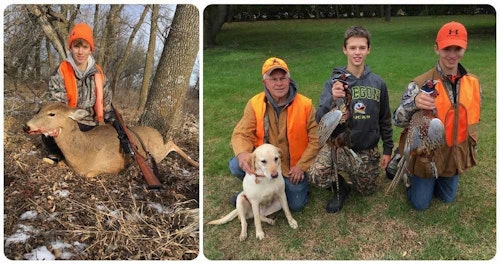Teaching a child or other newcomer to hunt should always prioritize safety, ethics and responsible outdoor practices. Here are three mistakes to AVOID when mentoring a new hunter:
1. Downplaying Hunter Education
Not stressing proper firearm safety, handling and awareness is a major mistake when teaching a newcomer to hunt. The same is true for bowhunting, as well as the use of treestands. Safety must be the No. 1 priority. A newcomer should learn to treat every firearm as if it's loaded, never point it at something they don't intend to shoot, and always keep the safety on until they're ready to fire. Similarly, great care should be taken when handling crossbows. Even with compound bows and traditional bows, new hunters should learn proper safety procedures at the range to eliminate the possibility of an accident.
Treestand safety should be demonstrated and practiced, too. All hunters regardless of age who plan to use treestands should have a full-body harness that fits. One model that works well for young hunters is the Hunter Safety Systems Lil’ Treestalker Youth Harness.
2. Skipping Ethics and Conservation
Failing to instill a sense of ethics (fair chase) and conservation in a new hunter can lead to irresponsible behavior. Teach a newcomer the importance of respecting wildlife and adhering to all hunting regulations. Emphasize fair chase and ethical hunting practices.
Don’t be afraid to discuss controversial topics. For example, talk about downsides of shooting at a running deer with a firearm, whether it’s responsible to shoot at big game animals at “way out there” range with archery gear, and how to deal with other hunters on public land (how close is too close for setting up duck decoys to another group, etc.).
3. Rushing the Learning Process
Rushing a child's learning process by introducing them to hunting before they are mentally and physically prepared is a recipe for failure. It's important to assess each child's individual maturity and ability to handle the responsibilities associated with hunting. Ending an animal’s life is no small matter.
Starting with age-appropriate activities such as joining you in a ground blind during your deer or turkey hunt and then gradually progressing to them hunting is a more responsible approach. Many young kids enjoy helping Dad or Mom while blood trailing a deer. They like helping to plant food plots. And jumping in the truck to go “looking for deer” at sunset is always a fun summertime activity. Show them all aspects of an outdoor adventure; you’ll know when they are ready to fully participate in the hunt.
Watch the weather forecast, too. While you might be able to endure harsh conditions in the field, understand that they likely don’t have the same top-notch gear as you. In fact, when I was teaching my two sons to deer hunt, I watched carefully as we dressed prior to heading into the woods. I put on the same amount of clothes that they had available. Not only was this a good lesson for me to know what I needed to purchase for them (more layers, thicker wool socks, waterproof gloves, etc.), but because we all left the comfort of my truck with similar clothing setups, I felt the same cold they were experiencing.

Final Thoughts
Teaching a child or other newcomer to hunt should be a careful, educational and safety-focused process that incorporates ethical values and emphasizes respect for wildlife and the environment. Rushing the process or neglecting safety and ethics can lead to negative consequences. Be patient, focus on fun and let the newer develop as a hunter at his or her own pace.






